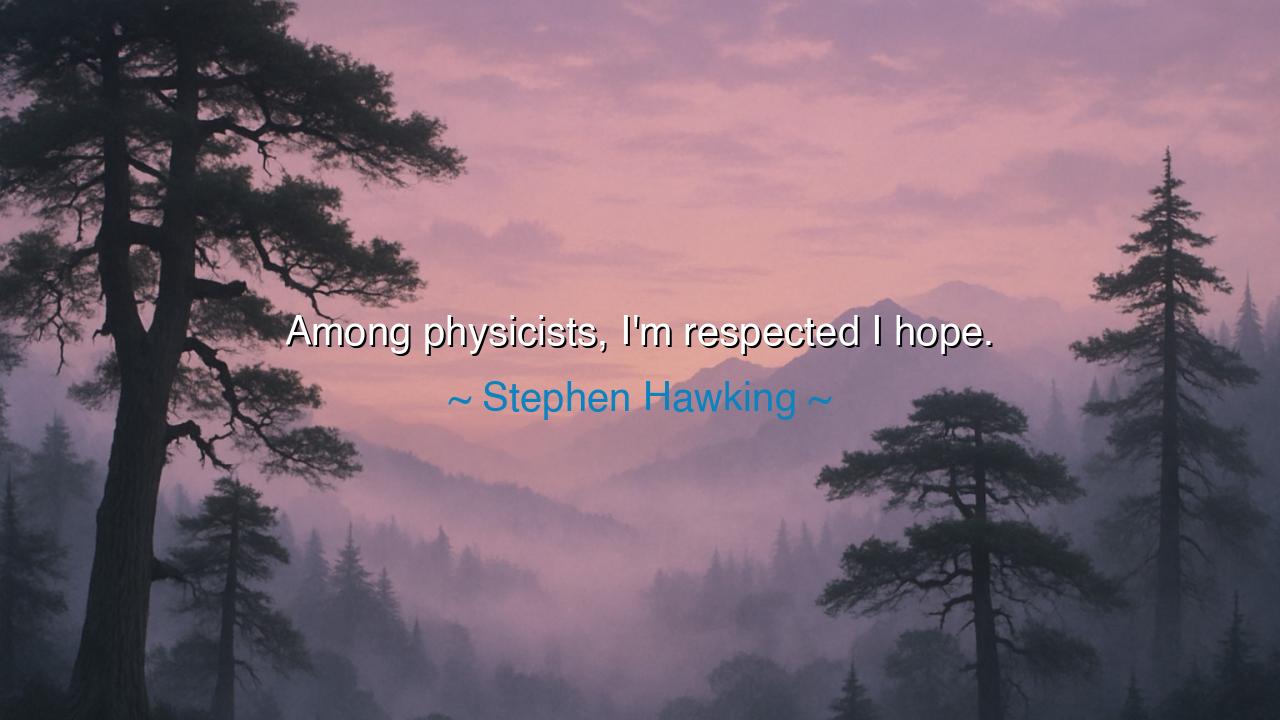
Among physicists, I'm respected I hope.






The words of Stephen Hawking — “Among physicists, I’m respected I hope.” — are spoken not in pride, but in profound humility. From a man whose mind wandered beyond the stars, who peered into the very birth and death of the universe, such a statement seems almost modest to the point of disbelief. Yet therein lies its greatness. In these few quiet words, Hawking reminds us that even the most brilliant among mortals desires not adoration, but respect — the recognition of one’s labor by those who walk the same arduous path. For respect, unlike fame, is not granted by the crowd’s applause; it is earned through integrity, endurance, and the quiet pursuit of truth.
To understand the depth of this quote, one must see the man who spoke it — a figure both frail and mighty. Stephen Hawking, confined to a wheelchair by the relentless hand of ALS, lived a life that seemed, at first glance, bounded by limitation. Yet within that immobile body dwelled one of the freest minds in human history. He defied not only his illness but also the boundaries of time and space themselves. Through his theories on black holes, singularities, and the origin of the universe, he reshaped the way humanity understands existence. And yet, for all his achievements, he spoke not of power, not of immortality, but of a simple hope: that his peers — those who knew the difficulty of the quest — would honor the sincerity of his search.
In this, Hawking stands among the philosophers of the ancient world — Socrates, Aristotle, and Archimedes — who knew that wisdom is never owned, only pursued. The true thinker does not claim to possess truth, but strives endlessly toward it, knowing that the universe always remains a step beyond comprehension. When Hawking said, “Among physicists, I’m respected I hope,” he revealed the soul of the true scholar: one who seeks not worship but understanding, not reverence but recognition by equals. For in the fellowship of minds lies a sacred bond — the brotherhood of those who labor in the pursuit of knowledge, who speak the same language of logic and curiosity.
This humility has always been the mark of greatness. Consider Isaac Newton, who once said, “If I have seen further, it is by standing on the shoulders of giants.” Newton, whose discoveries changed the course of science, acknowledged that his vision was built upon those who came before him. Hawking inherited that same spirit. He did not set himself above his peers, but among them — as a fellow traveler through the mysteries of existence. Like Newton, he understood that science is not a throne to sit upon, but a ladder that all climb together, rung by rung, toward the infinite.
Yet Hawking’s words also carry a quiet ache — a longing that even the greatest minds know too well. For the life of the thinker is often lonely. Those who venture farthest into the unknown walk alone, misunderstood by many. Hawking’s life, spent in both brilliance and isolation, reflects this truth. His illness separated him physically from others, but it also granted him a vision unclouded by vanity. When he spoke of respect, it was not the vanity of the ego, but the yearning of the human soul — the desire to be seen, understood, and valued by those who share one’s quest. In this way, his words transcend science; they become the universal prayer of every soul that dares to create.
There is also, hidden in this statement, a lesson about human dignity. Hawking, a man who had lost control over nearly every physical function, retained mastery over his spirit. He could have spoken of despair; instead, he spoke of hope — not for fame or pity, but for respect. It is this quiet dignity that transforms his words into something greater than a personal reflection; they become a teaching. They tell us that one’s worth does not lie in strength of body or abundance of wealth, but in the integrity of one’s work and the sincerity of one’s pursuit.
The lesson we may draw from Hawking’s words is clear and profound: seek respect, not applause. Do your work not to be admired, but to be understood. Let your life’s purpose be a contribution to truth, beauty, or kindness, and not a performance for fleeting praise. Respect, once earned, endures beyond time — for it is the judgment of those who know your struggle, not the fleeting approval of those who do not. Like Hawking, let us all learn to measure success not by the roar of the crowd, but by the silent nod of the wise.
So remember the quiet strength in his humility. When you labor for something noble — whether in science, in art, or in the service of others — do not look over your shoulder for recognition. Simply do the work. And if, when all is done, those who know the worth of such labor can look upon you and say, “You have done well,” then that, as Stephen Hawking said with quiet grace, is enough. For respect among the worthy is the truest form of immortality.






AAdministratorAdministrator
Welcome, honored guests. Please leave a comment, we will respond soon